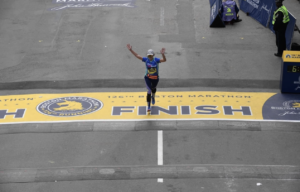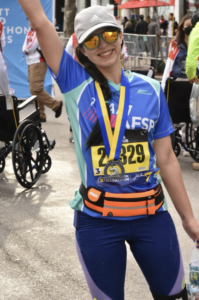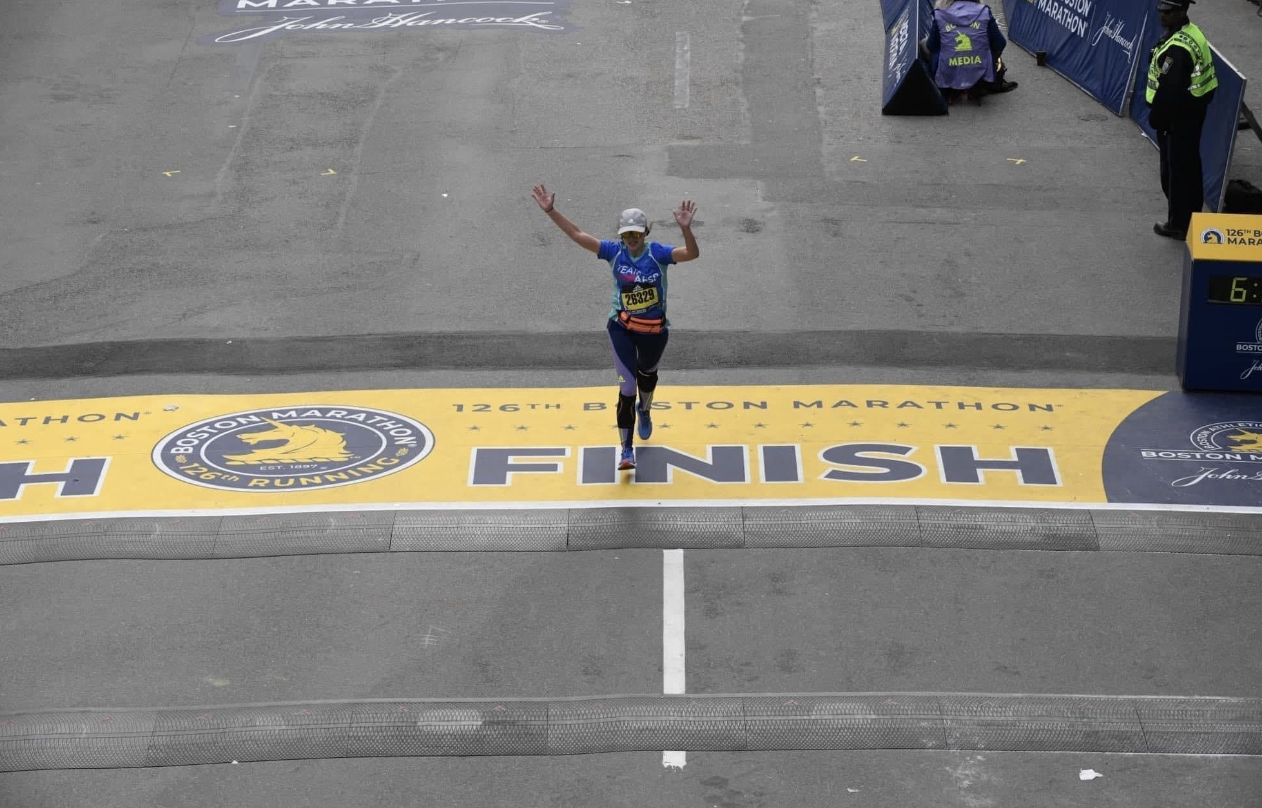Hendricks County Woman Honors Father and Fundraises for Suicide Prevention Through Marathons
Writer / Christy Heitger-Ewing
Photography Provided
Four years ago, Vicki Hopkins had just gotten out of a yoga class when her phone rang. It was her father, Bob Riley. The pair chatted for an hour, which was rare but appreciated. That night he sounded positive and upbeat, talking about the plans he had for the following week. A sense of relief washed over Hopkins to hear her dad’s happy voice, because he had spent the majority of his life struggling with depression. The sadness had only been exacerbated after his wife passed away, as they had been together for 33 years.
Following their call, Hopkins texted her dad saying she hoped he continued to feel better, both mentally and physically. He responded, “I’m proud of you. Your mom would have been proud of you and the parent you’ve become. Never change. I love you.”
In hindsight, Hopkins can see that this was his goodbye to her. The next day her aunt called with tragic news that her father had attempted suicide, and was on life support because he was an organ and tissue donor. Hopkins and her husband, Brett, gathered their three children, Veralee, Vayzen and Acadia, and drove 1,000 miles to the hospital where she spent the next three days making excruciating decisions and saying her goodbyes. Then the horrific grieving process began.
Grief following a suicide is all about survival mode.
“It’s completely devastating,” Hopkins says. “You’re in this fog. Everything feels unreal.”
Shortly after her dad died, her aunt started a memorial fundraiser to raise money for the American Foundation for Suicide Prevention (AFSP), a national organization that funds research, education, advocacy and support for those affected by suicide. The AFSP has chapters all over the country and hosts overnight walks, community walks and campus walks for those who wish to support mental health.
Although Hopkins previously lived in Boston, it wasn’t until she moved from Boston to Hendricks County that she decided to fundraise for the AFSP by running the Boston Marathon.
“I’m not fast at all, but I pushed myself out of my comfort zone to be a mental health advocate,” says Hopkins, who applied to be part of a charity run, and only got the green light to do so three months prior to the race. That meant she had a brief window of time to raise the mandatory $10,000 for the charity run.
“If you don’t raise it, it charges to your card,” Hopkins says.
When she was fundraising for the Boston Marathon, she employed some rather creative means to raise money. For instance, she painted several watercolor portraits of houses and photographed weddings. In fact, she shot a wedding the day before she left for Boston.
Running the Boston Marathon was grueling but gratifying.
“It was so freaking hard,” she says. “I had blisters. My hands were swollen. I was in pain. I crossed the finish line and said, ‘I hated that. I have to do it again.’”
And she did – two more times. She ran the Chicago Marathon in October of 2022, and a month later completed the Monumental Marathon in Indianapolis. Next up is the New York City Marathon, which will take place in November. In total, Hopkins has raised more than $15,000 for the AFSP, and she’s currently fundraising for her New York City race.
Hopkins started running 12 years ago to help her rebound from postpartum depression. Although she enjoys the activity, she doesn’t do it regularly.
“I have knee pain and scar tissue from tearing a meniscus in taekwondo back in middle school,” she says. “The week before the Chicago Marathon I told my doctor, ‘I’m going to run either way, but will I severely injure myself by running this?’ He said not to make any sudden movements and stay on level ground.”
Chicago Marathon I told my doctor, ‘I’m going to run either way, but will I severely injure myself by running this?’ He said not to make any sudden movements and stay on level ground.”
Part of the reason Hopkins runs marathons to promote mental health is because she finds that completing a marathon is more mental than physical. This is especially true when you’re slower.
“When you’re running for five or six hours straight, you need mental fortitude to get through that,” Hopkins says. “Plus, it’s a good time to think. Running is meditative.”
The difficult factor in any mental health issue is that it’s not visible the way physical ailments are, and we can’t possibly know just by looking at someone what they are thinking.
“Losing someone to suicide is not the same as losing a loved one to an illness, an accident, or through natural causes,” Hopkins says. “Following a suicide there is so much attention around the actual loss, but the people who are surviving the loss don’t get the attention and support they need.”
Research shows that it takes suicide loss survivors an average of four years to reach out for assistance after suffering the loss. In addition, loss survivors are more likely to die by suicide themselves.
At the time her dad died, Hopkins didn’t know anyone else who had dealt with suicide loss, but that’s no longer the case. Hopkins found it therapeutic to connect with other suicide loss survivors through the AFSP.
“It was so powerful to talk about things with them that you can’t with people who haven’t experienced this type of loss,” she says.
Hopkins is frustrated by the lack of mental health resources in this country.
“Therapy often isn’t affordable or even accessible,” she says. “Plus, there’s a severe lack of mental health professionals. There’s nothing more disheartening than being in the midst of mental health crisis and being told that there’s a six-month wait list. That’s an eternity when you can’t think about what’s going to happen in the next hour.”
Mostly, Hopkins just wants people to feel less alone.
“Literally everyone has struggles,” she says. “Just not everyone is open about it.”
This is precisely why Hopkins is passionate about raising money and awareness for the AFSP. She wants to make known all of the resources that do exist, so people can utilize them.
To connect with Hopkins, email vrhopkins25@gmail.com. If you’ve lost someone to suicide, a support group for suicide survivors meets on the first and third Tuesday of the month at Hendricks Regional Health in Danville. For more information, call Sharon Samsell at 812-878-2034.
If you’re struggling with suicidal thoughts, text 988 for crisis support. Use this QR code if you’d like to donate to Hopkins’ New York City AFSP race.
 QR CODE HERE.
QR CODE HERE.







Comments 2
Such a sweet last conversation. I’m sure both of Vicki’s parents are bragging about their wonderful daughter in Heaven today.
Thank you so much for such a sweet comment. It really made my day.